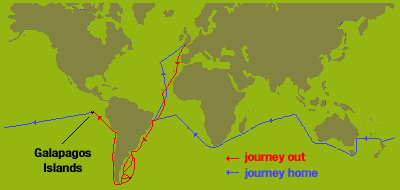CHARLES ROBERT DARWIN
CHARLES ROBERT DARWIN was born in Shrewsbury, Shropshire,
England on 12th February 1809.
In 1825 he studied medicine in Edinburgh
but left to study divinity at Cambridge, as he had the unfulfilled ambition
to become a clergyman of the Church of England.

In
1831 Captain Robert Fitzroy invited him to be the naturalist on board
the HMS Beagle that was leaving for a five-year voyage surveying the
waters around South America. During which time Darwin went to the Galapagos
Archipelago.
 |
On
16 September 1835 Darwin set foot at the western end of Chatham Island,
which is more commonly known by its modern day name of San Cristobal.
He said it was a desolate place. The next day he went on to Stephens
Bay, close to the present day Puerto Grande, and was delighted as it
‘swarmed with animals’. He observed the archipelagos’ 13 finches, now
called Darwin’s finches, and noticed that from island to island where
their food source differed the finches beaks also differed seemingly
to suit the vegetation on their particular island.
He spent only three weeks on the Galapagos Islands but in the course of that short visit changed the views of the world. His book the ‘Voyage of the Beagle’ was published on his return to England and made his name in the scientific community.
 |
He spent only three weeks on the Galapagos Islands but in the course of that short visit changed the views of the world. His book the ‘Voyage of the Beagle’ was published on his return to England and made his name in the scientific community.
In
1859, Alfred Russel Wallace was about to publish a theory that was the
same as Darwin’s. ‘The Theory of Evolution’. Because of this Darwin
finally published his own book ‘On the Origin of Species’ he was scared
of publishing because he was fully aware of the implications his theories
held. It went against the beliefs of Church and public that we are all
God’s creatures, made and remaining how God had intended on the day
of creation. Often referred to as ‘the book that shook the world’ it
sold out on the first day. His theory was attacked from all sides for
years, particularly from religious leaders, as its central tenant places
human evolution firmly alongside animal evolution. Thus removing the
divine image we had of ourselves.
‘On the Origin of Species’ changed
the way man looked at himself and the world around him and was substantially
inspired on his observations made in the Galapagos Islands. He claimed
that an animal or plant produce offspring that vary slightly from their
parents. The offspring most suited to their particular environment by
the process of ‘Natural Selection’ are stronger, live longer and are
more likely to reproduce. Gradually as the process continues, a new
subspecies evolves. This process could be observed in Galapagos from
island to island, or even from volcano to volcano
Charles Robert Darwin died in Downe, Kent, on 19
April 1882